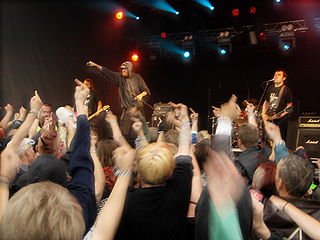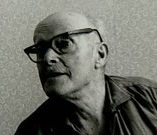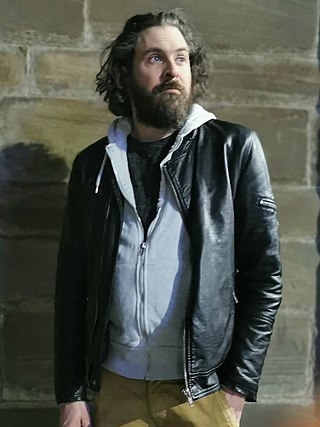
Oi Polloi are a punk rock band from Scotland that formed around 1981. Starting as an Oi! band, they are now generally more associated with the anarcho-punk genre. The band has become notable for their contributions to the Scottish Gaelic punk subgenre. The name comes from the Greek expression "οἱ πολλοί", Anglicized hoi polloi, meaning "the masses" or "the common people".

BBC Gàidhlig is the department of BBC Scotland that produces Scottish Gaelic-language (Gàidhlig) programming. This includes TV programmes for BBC Alba, the BBC Radio nan Gàidheal radio station and the BBC Alba website. Its managing editor is Marion MacKinnon.

Bòrd na Gàidhlig is the executive non-departmental public body of the Scottish Government with responsibility for Gaelic. It was established by an Act of the Scottish Parliament in 2005 and is based in Inverness.

Scottish Gaelic punk is a subgenre of punk rock in which bands sing some or all of their music in Scottish Gaelic. The Gaelic punk scene is, in part, an affirmation of the value of minority languages and cultures. Gaelic punk bands express political views, particularly those related to anarchism and environmentalism.

Mill a h-Uile Rud is a Seattle-based band who sing in Scottish Gaelic.

Murdo Macfarlane known as Bàrd Mhealboist was a published poet, songwriter and campaigner for Scottish Gaelic, especially during the 1970s, when the Ceartas movement was gaining strength.

An Comunn Gàidhealach, commonly known as An Comunn, is a Scottish organisation that supports and promotes the Scottish Gaelic language and Scottish Gaelic culture and history at local, national and international levels. The society is closely associated with the Royal National Mòd. The symbol used for An Comunn Gàidhealach is the Irish Sunburst flag at the top also a symbol associated in Irish mythology and the Celtic harp on the bottom right.
Gaelic broadcasting in Scotland is a developing area of the media in Scotland which deals with broadcasts given in Scottish Gaelic and has important links with the efforts of Gaelic revival in Scotland. As well as being informative, Gaelic broadcasting in Scotland has acquired some symbolic importance. Whilst opinion polls show that the vast majority of Gaels feel they have been ill-served by broadcasting media, Scotland now has Gaelic broadcasting all over Scotland both on television and radio.
The Scots Trad Music Awards or Na Trads were founded in 2003 by Simon Thoumire to celebrate Scotland's traditional music in all its forms and create a high profile opportunity to bring the music and music industry into the spotlight of media and public attention. Nominations are made by the public and in 2019 over 100,000 public votes were expected across 18 categories.
Fèisean nan Gàidheal is the National Association of Scottish Gaelic Arts Youth Tuition Festivals. Established in 1988, it is the support organisation for the Fèisean which are local Gaelic Arts tuition festivals. The current Chief Executive Officer is Arthur Cormack.

Mary Ann Kennedy, is a Scottish musician, singer, choral director, composer, radio and television presenter, and music producer.

Joy Dunlop is a Scottish broadcaster, singer, step dancer and educator from the village of Connel in Argyll, who now lives in Glasgow, Scotland. Singing predominantly in Scottish Gaelic, she performs folk music, song and dance in a contemporary style rooted in the tradition. She is a weather presenter for BBC Scotland and BBC ALBA and formerly a volunteer radio presenter with Oban FM
Mary MacPherson (née MacDonald), known as Màiri Mhòr nan Òran or simply Màiri Mhòr, was a Scottish Gaelic poet from the Isle of Skye, whose contribution to Scottish Gaelic literature is focused heavily upon the Highland Clearances and the Crofters War; the Highland Land League's campaigns of rent strikes and other forms of direct action. Although she could read her own work when it was written down, she could not write it down herself. She retained her songs and poems in her memory and eventually dictated them to others, who wrote them down for publication. She often referred to herself as Màiri Nighean Iain Bhàin, the name by which she would have been known in the Skye of her childhood.
Maggie Macdonald was a Scottish Gaelic singer and primary school teacher. She was a Mòd gold medallist and sang with the Gaelic super-group, Cliar. She was part of The Campbells Of Greepe, along with other family members.
Mac-Talla was a Scottish Gaelic "supergroup" formed in 1992 at the suggestion of record label owner Robin Morton. Morton credited the individual band members as some of those responsible for bringing Gaelic music to wider public attention.

Marcas Mac an Tuairneir is an English writer and singer. He writes and publishes in Scottish Gaelic, English and Polari.
John MacInnes, 3 April 1930 in Uig, Lewis – 10 May 2019, was a Scottish Gaelic scholar and authority on Scottish Gaelic oral tradition. He was born in Uig, Lewis, but grew up on Raasay, and took an active interest in Gaelic tradition while still young and made a conscious effort to seek it out amongst his family and community.
Alasdair MacIlleBhàin is a singer and songwriter from Mull, performing primarily in Scottish Gaelic, who has performed widely on an international basis.
Eilidh Watt was a Gaelic broadcaster and writer from the Isle of Skye. She was a campaigner for equality and women's rights.
Sian is a Scottish all-female traditional band who are known for their Gaelic vocal harmonies and celebrating Gaelic songs composed by women. They formed to raise the prominence of work by female Gaelic bards, which might not have received much attention or credit otherwise.









